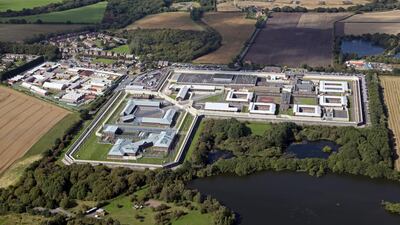LONDON // Some of Britain's most prominent convicted extremist terrorists have been isolated in a separate jail wing for the first time in an attempt to prevent the recruitment and radicalisation of other prisoners.
Frankland Prison in Durham, which holds Michael Adebolajo, killer of the soldier Lee Rigby, and extremist recruiter Anjem Choudary, was reported to have set up a "jail within a jail" in a move that has provoked warnings that the terrorists will be given a special status.
Inmates at the prison include the Yorkshire Ripper Peter Sutcliffe, serving a whole life sentence for the murders of 13 women and attempted murders of seven others.
Newspapers reports tagged the “separation centre” as a "jihadi jail'. The isolated unit’s first inmates includes both Adebolajo and Choudary. Two further units are expected to be opened at Full Sutton prison near York, and Long Lartin in Worcestershire over the coming months as part of the government’s efforts to combat radicalisation within the prison system.
Inmates will be reviewed every three months and returned to general prison population if their threat level has reduced sufficiently.
The separation centres represent a change in the UK’s tactics for combating dangerous offenders, who until now have been dispersed throughout the prison population.
The change in strategy comes after a review last year of Islamist extremism in prisons by Ian Acheson, a former prison governor, suggested that these dangerous extremists “need to be completely incapacitated from being able to proselytise to the rest of the prison population”.
Prisons minister Sam Gyimah said: “ Extremism must be defeated wherever it is found. The most dangerous and subversive offenders are now being separated from those they seek to influence and convert - an absolutely crucial element of our wider strategy to tackle extremism in prisons and ensure the safety of the wider public.”
However, fears remain that these separation centres will grant extremist terror offenders a unique status within the prison system.
“A policy of concentration may inadvertently help to create the kind of hierarchical organisation that the terrorists found it impossible to create outside,” warned Professor Peter Neumann, a counter-terrorism expert at the International Centre for the Study of Radicalisation and Political Violence, King’s College London.
Despite supporting the new system, Lord Carlile, a former independent reviewer of counter-terrorism legislation, said: "It gives them special status in their own minds and also creates leadership structures which may not be healthy. Yes the unit should be available but it doesn’t mean that every terrorist prisoner should be held in one of those units.”
A survey by the BBC revealed that 109 people have now been convicted of terrorism offences relating to Syria and Iraq since 2014. Of those convicted, more than 85 per cent have never been to Syria or Iraq.
“We need to be acutely aware that if people can’t go to Syria - and we have seen this in some of the cases we have prosecuted - they may plan a sort of an attack here instead or they may do more to radicalise other people here to attack so we need to be very aware of that,” said the director of public prosecutions, Alison Saunders.
In addition to separation centres, more than 4,500 front-line police officers have been given the latest specialist counter-extremism training in order to identity and challenge extremist views. This has been implemented as standard training for all new prison service recruits.

